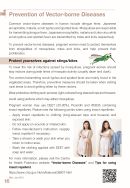Prevention of Vector-borne Diseases
Common vector-borne diseases in human include dengue fever, Japanese encephalitis, malaria, scrub typhus and spotted fever. Mosquitoes are responsible for transmitting dengue fever, Japanese encephalitis, malaria and zika virus while scrub typhus and spotted fever are transmitted by mites and ticks respectively.
To prevent vector-borne diseases, pregnant women need to protect themselves from stings / bites of mosquitoes, mites and ticks, and help prevent their proliferation.
Protect yourselves against stings/bites
To lower the risk of infections spread by mosquitoes, pregnant women should stay indoors during peak times of mosquito activity (usually dawn and dusk).
The vectors transmitting scrub typhus and spotted fever are mainly found in the vegetated areas. Therefore, preventive measures should be taken when visiting rural areas to avoid getting bitten by these vectors.
Wear protective clothing such as loose, light-coloured long-sleeved tops and trousers.
Avoid using perfume which may attract mosquitoes.
Pregnant women may use DEET (20-30%), Picaridin and IR3535 containing insect repellents. Please note the following points when using insect repellents:
- Apply insect repellents to clothing (long-sleeved tops and trousers) and exposed skin;
- Do not apply on wounds or irritated skin;
- Follow manufacturer's instruction, reapply insect repellent if necessary;
- Take a shower or wash your skin when you return to indoor area;
- Wash the clothing applied the DEET with soap and water.
For more information, please visit the Centre for Health Protection website "Vector-borne Diseases" and Tips for using insect repellent.
